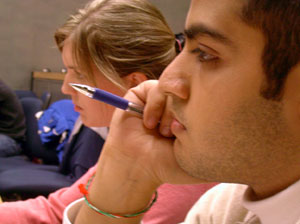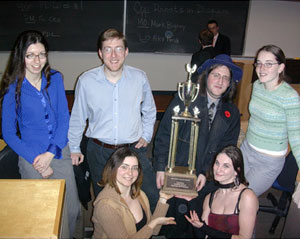 | ||
| Participants must carefully listen to valid cases in point and plan a rebuttal. Photo credit: Michael Currie | ||
The Sodales Invitational is one of three annual tournaments hosted by the society and facilitated by the Canadian University Society for Intercollegiate Debate (CUSID), which is the main body for university debate in Canada. The coordinators of this tournament were Sodales members Samina Thind and Jen Bond (both 3rd year political science students) who, with their strong persuasive skills and commitment to the society, made their case why other debating societies should attend (and won). Those who rose to the challenge included debating teams from Atlantic Canada as well as Montreal.
Sodales is a student-led club whose members come from many different backgrounds and interests. Aside from representing 黄色直播 at regional, national and international debating competitions, their mandate is to promote debating, rhetoric and public speaking. One thing is clear - they have fun knocking heads. Even the word Sodales can be debated at length on its exact meaning, origin, and why the debating society chose it. While no body is actually sure how Sodales got its name, after hours of searching one comes up with the latin description of 'companion and friend.'
 | ||
| Winners of the Sodales Invitational Tournament attend the awards ceremony held at the CIBC auditorium in the Computer Science Building. Photo credit: Michael Currie | ||
Society President Amol Verma, of Halifax, is a fourth year microbiology and immunology student. For him, debating offers "... a richness of subjects you get to explore, which both broadens your perspective and increases your knowledge about a variety of topics. Secondly, the impromptu nature of this style of debate really forces you to think quickly on your feet - and I like that."
There is no need to argue that point, because Amol won the 2002 Atlantic Championship with partner Gavin Magrath. If you did, you'd better find a good rebuttal. "You can say we've historically been the largest and most successful debating society in Atlantic Canada," says Verma. Sodales brings credentials to the table, including being the Atlantic Canadian Champions in 2002.
The winning team for the 2005 Sodales Invitational Tournament was a hybrid team from Marianopolis College and McGill University (Alex Amar and Mark Bigney). Second place was another hybrid team from Acadia/University of Toronto (Patrick Legay and Chris Graham). The top individual speaker was Pam Anderson from the University of New Brunswick.
I'm quite sure all of these people know exactly what they are going to wear first thing in the morning.
Just look at their and check out the 脢Executive members page to learn more about the Society. 聽
